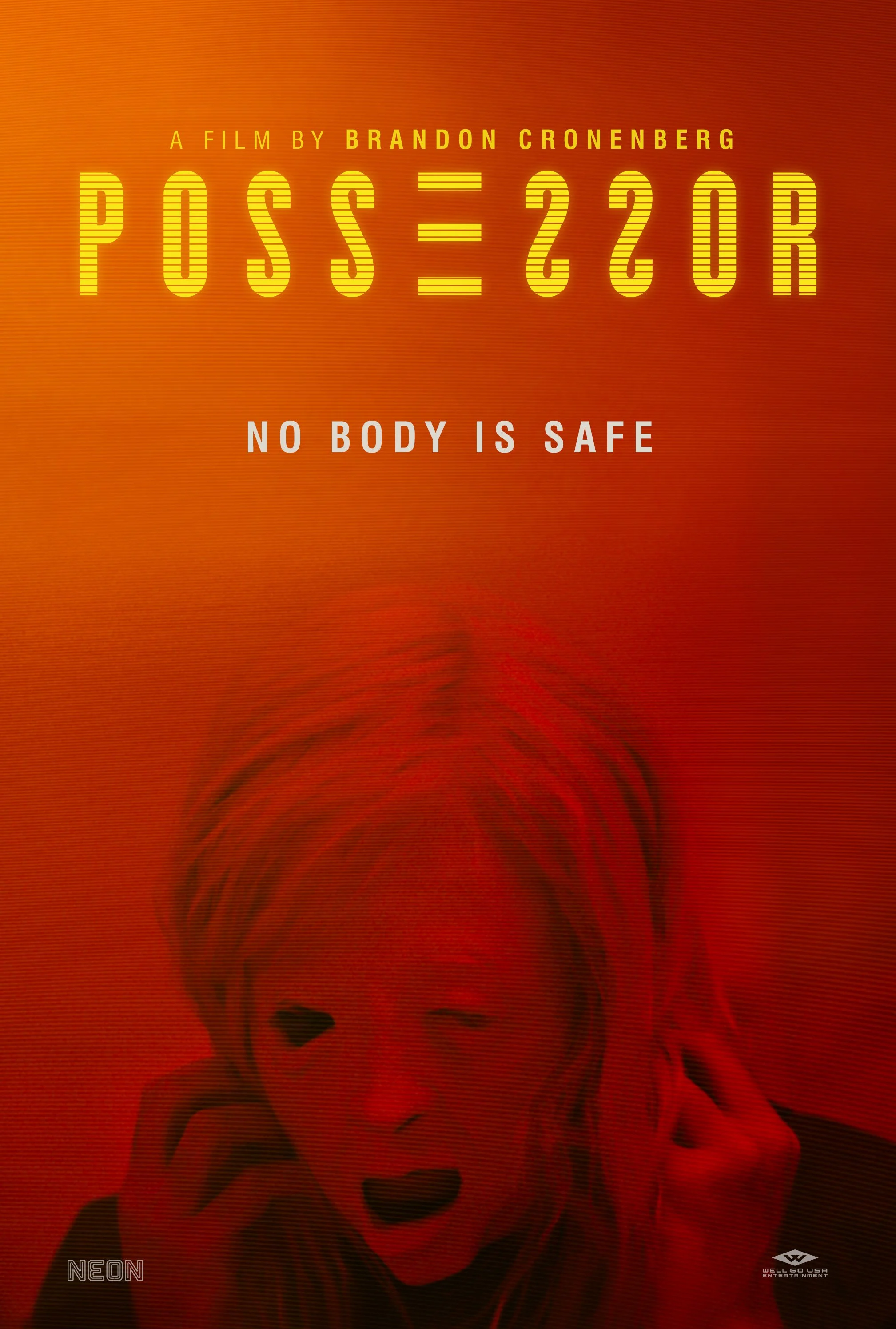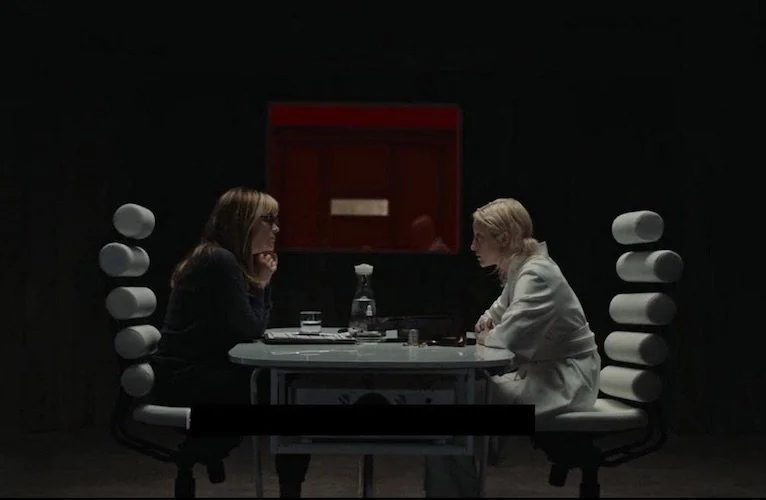Possessor, Losing Control and Gender Identity
Possessor, Losing Control and Gender Identity
By Lor Gislason
Spoiler Alert: This article talks about key action and plot points in Brandon Cronenberg’s film “Possessor”
When people first look at you, what do they see? What do they assume based on your appearance? Most of the time what they take in is pretty banal: the colour of your clothes, your hairstyle, that sort of thing. What gender do they think you are, based on your looks? If you’re cis, this generally doesn’t cross your mind—they see a woman because I am a woman, etc. But I don’t fit into that. I consider myself genderqueer, with aspects of both masculinity and femininity. It can be confusing or difficult for people to guess about a gender non-conforming person (which is sometimes the point entirely). It’s become a joke online from ignorant and transphobic people: Did you just assume my gender?
No one I know has ever said this and it generally seems to be a joke saying all trans and GNC people are overly sensitive and will jump down your throat at a moment’s notice. It purposefully diminishes how important gender affirmation is while delegitimizing and stereotyping trans people. This is partly why we need to dismantle hetero- and cisnormativity (which I realize is a massive undertaking) to create safer environments for everyone.
While often this is just straight-up ignorance and blatant transphobia, I find that often people just don’t know what transphobia even is. While queer people have been dealing with, and understanding, these issues for a long time, the “average joe” (by which I mean a heteronormative cis man) could be completely unaware of the issue. According to Shelley¹, “the person who uses what we recognize as transphobic insults may not be aware that they are transphobic; they only see someone who transgresses some norm and react negatively without fully comprehending what their reactions mean, or how they can be characterized.” Many in the queer community have educator fatigue - emotional and mental exhaustion from re-iterating the importance of the subject - which is why discussions about it need to be normalized.
On the flip-side, it’s extremely common in the LGBT community as a whole to feel different, unsure of ourselves and frustrated because we know something is happening but do not have the language to express it. It is only from exposure to these terms that we can learn to understand and explore our identities. Several trans friends of mine only came out after befriending other queer people and learning “there’s a name for what you’re feeling”.
I know what I look like. I’m fat, I have a baby face and a feminine body shape. I have pink hair. I wouldn’t blame you for seeing me and taking a calculated guess that I’m a cis woman. For years this assumption has made me incredibly uncomfortable, to the point of dysphoria. The fact that people do this - and there’s nothing I can do about it - has made me hide who I am, hide my body under layers of clothes and hide from the world. In essence, I had become the popular meme about not being perceived, preferring to be invisible.
The progression from being terrified of being seen and being as loud and colourful as possible was slow and is still a struggle with the anxiety-ridden parts of myself. Unconsciously I began as an aggressive, still-ongoing fight against the gender-coding of “blue is for boys” and “pink is for girls” by using the brightest and most obnoxious shades of both colours. I had transformed my fear of others’ acknowledgement by making it impossible to do anything else - my fashion was my shield. Instead of people avoiding me because of my plainness, they avoided me because of my garishness.
Which is funny - for years I refused anything to do with pink. After discovering both gender expression and my fashion sense, I took this to the extreme. Pink and blue became my best friends. I love mixing the two stereotypical gendered colours to say I am both at once. To this day I regularly dye my hair in both colours and most people know me by my pink hair.
The unfortunate side effect of this is a built-in gender stereotype; the aforementioned assumption that I am a woman and a very femme person in general. Pink is for girls, after all. Being referred to by she/her pronouns and collective terms for women---lady, girl, miss---makes me want to throw up. Correcting pronouns at my job was a constant struggle between comfort and outing myself to a pretty conservative crowd. As my main task was to help others, it also felt selfish to turn the conversation to myself (something I am not comfortable with at the best of times).
Maybe due to this constant casual misgendering, I pushed how I felt to the back of my mind, only for it to resurface in vulnerable moments. It didn't matter, because honestly, there are many more important issues at hand - once again, I just don't want to think about myself.
All of this blasted back in my face once I saw Brandon Cronenberg's Possessor. I had been eagerly awaiting it for a while, having seen the incredible trailer. Living in a small town I truly did not expect it to come here at all; colour me surprised when we even got the Uncut version. Of course, we saw it as soon as possible, and soon I was facing my insecurities on the big screen. It’s been months since I first saw the film and a testament to its impact on me that I still think about it almost daily.
The title of Possessor is quite literal; the main character Tasya Vos is a futuristic assassin. She takes over the body of another, kills the target and ends the host's life, “pulling out” to return to her own body. The opening scene sets up that she's hesitant about ejecting, preferring to commit suicide by cop rather than shooting herself. She puts the gun in her mouth and begins crying, shaking. It’s left unclear whether this is the host reacting to the circumstances or Vos’s own unwillingness to return to herself. In my opinion, the best horror movies can have multiple interpretations, leading to discussions like this.
Vos awakens attached to the possession apparatus, the shock of returning immediately making her vomit. As she begins, the general debriefing presents her with items belonging to trigger memories - one of which is of Vos and her father killing and mounting a butterfly when she was a child. She still feels guilty about it. Upon hearing her levels are all normal, she looks surprised. Is she more comfortable when not trapped within the confines of her flesh? Her boss questions her about her hesitation to pull out before sending her home.
The butterfly is both a connection to her past and a literal grounding device designed to propel Vos back into herself: this is who you are. A dead insect forever preserved under glass, stabbed through its delicate wings, a beautiful and slightly morbid object to be admired, nothing more. Often women - especially trans women - are treated this way, objectified and abused, leading them to remain in the closet or pretend to be something they’re not. While I am not a woman, before I understood my gender I was assumed to be one. I had these same experiences; I was objectified and sexualized as a child and teen, treated like I was just an object to look at. I developed an eating disorder that still affects me years later.
Vos does not look like a typical "leading lady" for a film. While the actress that plays her, Andrea Riseborough, is a conventionally attractive cis woman, the character of Vos appears gaunt, her hair generally slicked back and a vacant, distant expression. She's not what you expect from a cool sci-fi thriller. Riseborough also played the titular Mandy, released in 2018, who has a prominent facial scar and a similar spaced-out appearance. I don't think there's any connection between these roles but it's interesting to note she doesn't always play done-up women.
We cut to the next scene, which to be is the most indicative of the character as a whole, and the reason I see this through a trans lens - where Vos stands at the edge of her neighbourhood practising how she will greet her husband and child. It’s awkward and forced - this is not easy for her. While this may be an adjustment period after returning to her own body, I see it as dysphoria and unease with her assumed role in her family’s life. Vos seems incredibly out of place with her husband and his friends, politely smiling and laughing at the right moments in conversations but not participating herself. She, and many others, box themselves into this gender norm. Frohard-Dourlent² explains “we all live complex gendered lives that at times reify notions of masculinity and femininity. This means that gendered patterns can develop, regardless and maybe because of the constructedness of gender.”
When they have sex, Vos appears distant and uninterested. She is a living deception in which she pretends (badly) to be an attentive wife and caring mother. It does not feel all-consuming to her husband because he is on the outside looking in and there is nothing that can truly replicate another person's experience. Vos immediately asks for a new assignment---preferring to lose herself (literally) in her work than be with her husband.
Vos is briefed on her next target: she is to possess the body of a man named Colin and execute his fiancée, Ava, as well as his father-in-law John for the benefit of the unnamed possession company. To get into character, as it were, Vos stalks Colin and observes his speech patterns, repeating phrases over and over until they become second nature, similar to her rehearsing how to greet her family earlier. When your profession is to impersonate completely it has to be perfect. Not unlike the way many trans people, for fear of coming out and the inherent violence that comes with it, impersonate the gender they were assigned as a baby.
Sometimes, that’s all it takes to lose control, that small thought, like a tiny fracture. An offhand comment by her boss. Once you begin questioning your assigned role, there is no turning back. The dam has been broken. As Vos “interfaces” with Colin, we see images of her body physically melting to reform as her new host. It’s very evocative of how we mould ourselves, our appearance to suit our needs.
(For simplicity I will continue using she/her for Vos even as she assumes Colin’s identity.) It's unknown whether Vos has possessed a male body before the events of the film, but it's immediately noticeable how comfortable she is in Colin’s body. She checks herself out in the mirror, running her hands down her chest, the smooth flat breasts, even grabbing and inspecting her new genitals. Colin's girlfriend even notices a difference, declaring him to be in a good mood and asking, What's with you today? You’ve gone strange on me.
In an interview with Decider³, director Brandon Cronenberg stated he "thought of this as a film about someone who may or may not be an imposter in their own life", harkening back to my own experiences, where I pretended to be something I'm not. As intolerable as it was, to me it felt like the best option. The alternative, to out myself and the uncertainty that came with that, was equivalent to throwing myself to the wolves.
The trans reading here is obvious. Vos was never comfortable in her life because the expectations of her as a woman were not what she wanted. Now it’s changed, and while she still needs to pretend, to imitate Colin’s life at work and home, it doesn’t seem forced. The only awkwardness comes from information Vos was not given previously such as the duties at his data mining job or the music he listens to.
To be seen as you truly are is an extremely liberating experience. Vos may have never been confronted so directly with her insecurities, and now it is impossible to ignore as she is now in a male body. Throughout the film (after Vos becomes Colin) flashes of their bodies physically merging become common. Their voices overlap, speaking together as one. The literal meshing of feminine and masculine. This is what I wanted to be, to shed my old self and become something entirely new, both sides working in harmony. Later, Vos and Ava have sex and we see Vos/Colin again combining, her head on his body, penis visible. In stark contrast to her apathetic intercourse with her husband earlier in the film, this is passionate and involved, not perceived obligation.
The psychic-warfare between Vos and Colin comes to a head as they have a mental battle, Colin eventually taking the upper hand and rupturing Vos's face between his fingers. Then he takes the sagging, empty shell of her visage and wears it like a mask. The outward appearance is monstrous and wrong, vacant eye holes and the mouth slightly hanging open. This isn't a real person; it's just an imposter.
It isn’t until the end of Possessor that Vos and Colin truly become one, forcefully. Vos/Colin kill her husband with a knife and shoot her son, severing her ties to her old life. The impact that these scenes of two separate entities becoming one left on me was enormous. In the end, Vos is once again shown the butterfly. She no longer feels guilty. She understands who she is and who she wants to be.
I soon began to realize the obvious: that the biggest critic in my life was myself. I had set up impossible expectations, wanting to be the perfect representation of androgyny and one of the “good queers”. The mask I wore was as fake and lifeless as Vos’s. I just needed something to violently shake me out of that mindset and understand that my gender identity is messy and imperfect, subject to change and grow as I do.
I’m doing much better these days, with less self-doubt about the way I’m viewed. I know the decisions I make truly are my own in regards to how I want the world to see me. All it took was a single thought, to lose control.
Lor Gislason (they/them) is an autistic non-binary homebody from Vancouver Island, Canada. Their articles have been featured on Hear Us Scream, Horror Obsessive and as the editor of the upcoming Bound In Flesh: An Anthology of Trans Body Horror from Ghoulish Books. Their dream is to one day make an encyclopedia covering body horror films.
Twitter: @lorelli_
Ko-fi: https://ko-fi.com/A147ERE
Sources
1. Shelley CA. Transpeople: repudiation, trauma, healing. Toronto, Ontario, Canada: University of Toronto
Press; 2008.
2. Frohard-Dourlent, H. (2016). Muddling through together : educators navigating cisnormativity while working with trans and gender-nonconforming students (T). University of British Columbia. Retrieved from https://open.library.ubc.ca/collections/ubctheses/24/items/1.0228782
3. https://decider.com/2020/11/03/brandon-cronenberg-interview-possessor-uncut-on-demand/









